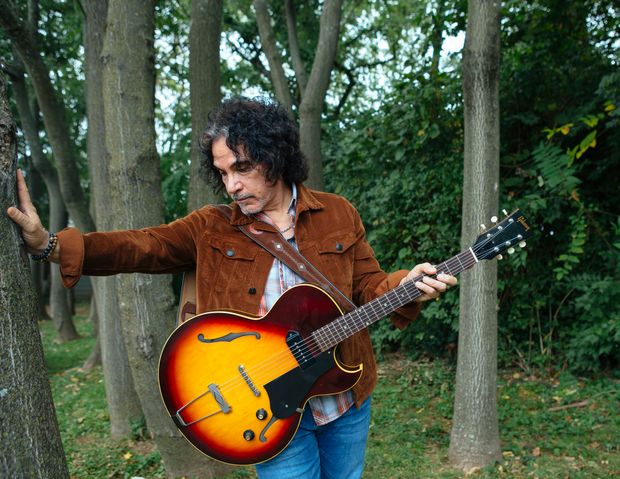There really is no group called Hall and Oates. The group you’re thinking of—probably the most successful duo in rock history—has, technically, included both partners’ first names in each of their 21 album covers: Daryl Hall and John Oates. This might seem like a distinction without a difference, but Mr. Oates says that this fact has always made it easier for him and his partner to move in and out of their solo projects.
“There’s a very important reason for that—at least in our minds,” he says. “We never wanted to be seen as a two-headed monster, a la Simon and Garfunkel, because we saw ourselves as two individuals who work together. It’s a subtle distinction, but it was important to us. It’s helped us each keep our own identities within our group identity, and I think it’s been a key to our success and longevity. We don’t have any need to try and work our own separate music into the act. We know who we are.”
Hall and Oates have sold tens of million of albums of their soul-infused pop music. On his own, Mr. Oates has taken a different tack in recent years, exploring country and blues-fueled American rock with an ace group of Nashville musicians, as heard on the recently released EP “John Oates with the Good Road Band—Live.” “Exploring this music with this band was a rediscovery of a part of my life that I put away for years while I was making pop music with Daryl,” says Mr. Oates, 72. ”It never left me. I would always sit on my couch playing these songs on acoustic guitar, but I never performed them.”
This side of Mr. Oates suggests how he might have spent his career had he not met Mr. Hall in 1967, when they were both students at Temple University in Philadelphia. Mr. Oates had already studied acoustic guitar with Jerry Ricks, a country blues player who helped his student meet and learn from originators like Mississippi John Hurt and Reverend Gary Davis.
“Jerry opened me up to the subtleties of acoustic music and how to be a real musician, and take the guitar to another level,” says Mr. Oates from his Nashville home. “At the same time, I was going to the Uptown Theater [in Philadelphia] on Saturday nights to see soul greats like Sam & Dave, Otis Redding, the Temptations and Smokey Robinson. Daryl’s influence had a lot to do with skewing toward that side because it was the commonality between us. The folk and blues stuff got pushed to the side.”
‘Maneater’ by Daryl Hall & John Oates
Hall and Oates became radio fixtures with ’70s folk soul hits like “She’s Gone,” “Sara Smile” and “Rich Girl,” then became ’80s pop MTV superstars by adapting new wave elements into minimalist smashes like “Kiss on My List,” “Private Eyes” “”I Can’t Go for That (No Can Do)” and “Maneater.” In his 2017 memoir “Change of Seasons,” Mr. Oates describes his ’80s lifestyle as “a blur of jaded privilege all along the jet set juggernaut,” a stereotypical rock-star existence that included a Lear jet, a fleet of sports cars, multiple homes, nightly partying at places like Studio 54 and a model wife. He had everything except control over his own life, a situation that he compares to a dysfunctional family in which no one explained what was happening to the kids—in this case, himself and Mr. Hall.
“We had huge commercial success, but I couldn’t say I was having fun, and eventually Daryl and I were floundering,” he says. “We needed a break after putting out a record and touring behind it every year from 1972 to 1986. I had no personal life, and I didn’t know how to get the things that were missing, but I was forced to change when the accountants said, ‘You have a lot of stuff but no money.’ I got smart and sold everything except a little condo in Aspen, where I moved and completely changed my life.”

‘We had huge commercial success, but I couldn’t say I was having fun,’ says Mr. Oates.
Photo: David McClister for The Wall Street Journal
Becoming a self-described mountain man, Mr. Oates set out in search of something more elusive than pop stardom: the good life. He shaved off his iconic mustache in a sort of ritual cleansing and spent a few years mostly skiing and riding his bike. He then met and married his second wife, Aimee, built a house and raised a son, Tanner.
“I really kind of checked out of the world of music through the whole decade of the ’90s other than some performances with Daryl,” says Mr. Oates. ”I finally started getting antsy to play again, which led me to doing some writing and recording in Nashville.”
Since 2009, Mr. Oates and his wife have split their time between Nashville and Aspen. In 2018, he released “Arkansas,” his first album with the Good Road Band, with whom he performed for two years before stopping to go back on the road with Mr. Hall—for a world tour that was canceled by the pandemic.
“I wanted to capture the Good Road Band in great form before we paused,” says Mr. Oates. They recorded a show at the Station Inn, a live music venue that is “our favorite spot to play in Nashville,” he says. “Once touring was put on hiatus, I thought putting it out might be a good substitute for a live show. This release is a product of the pandemic, and I’m happy to share it.”
Copyright ©2020 Dow Jones & Company, Inc. All Rights Reserved. 87990cbe856818d5eddac44c7b1cdeb8